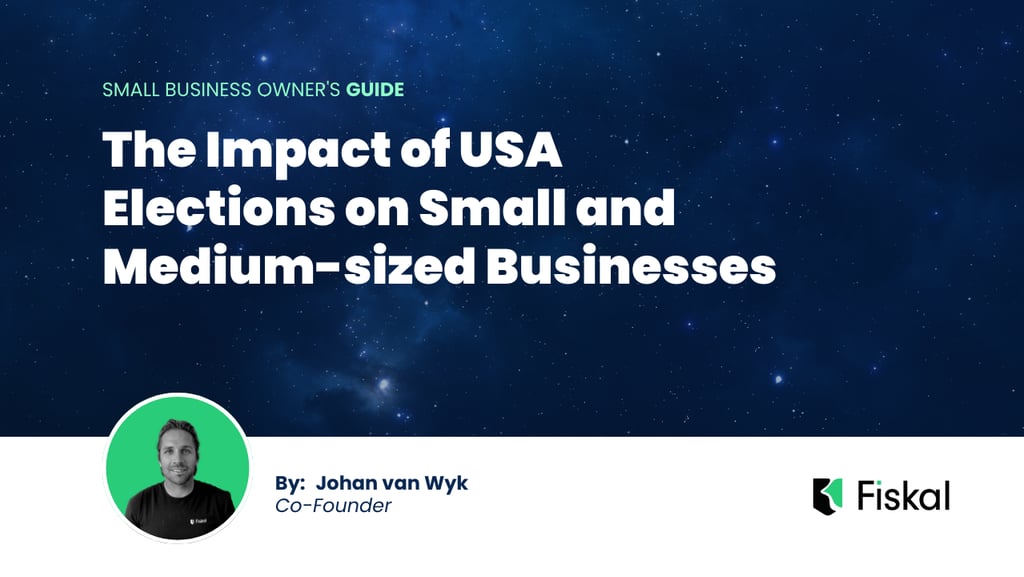The Impact of USA Elections on Small and Medium-sized Businesses: Exploring Opportunities and Challenges
As a pivotal event in American democracy, the USA elections have always held significant influence over various aspects of the country, including the economy. Small and medium-sized businesses (SMBs), in particular, are deeply impacted by the outcomes of these elections, facing a set of both opportunities and challenges. In this article, we will delve into the exploration of how USA elections can affect SMBs and what it means for their future. With different political parties proposing diverse economic policies, the business landscape can experience significant shifts, affecting SMBs across various industries. Policies related to taxation, healthcare, trade and regulations can potentially create new opportunities or disrupt existing business models. Therefore, it becomes crucial for business owners to understand the potential implications of the election outcomes and adapt their strategies accordingly. By analyzing the impact of USA elections on SMBs, we aim to provide a comprehensive understanding of how these businesses can navigate the changing landscape and harness the opportunities that arise. Join us as we dive into the intriguing world of elections and explore the endless possibilities they hold for small and medium-sized businesses.
SYSTEMS AND SOFTWARE


Understanding the political landscape and its influence on businesses
The political landscape in the United States is constantly evolving, with each election cycle bringing new policies, regulations and economic plans from different political parties. These changes can have a significant impact on small and medium-sized businesses (SMBs), as they often lack the resources and flexibility of larger corporations to adapt quickly to these shifts.
Understanding the political landscape and its influence on businesses is crucial for SMB owners to make informed decisions and position their companies for success. The policies proposed by the candidates, such as tax reforms, trade agreements and healthcare initiatives, can directly affect the operating costs, revenue streams and overall competitiveness of SMBs.
By closely monitoring the political landscape, SMB owners can anticipate potential changes and proactively develop strategies to mitigate risks and capitalize on opportunities. This may involve adjusting their business models, diversifying their product or service offerings or exploring new markets to offset the impact of potential policy changes. Staying informed and adaptable is key for SMBs to navigate the dynamic political environment and remain resilient in the face of change.
Opportunities for small and medium-sized businesses during elections
The election season in the United States presents a unique set of opportunities for small and medium-sized businesses (SMBs) to thrive and grow. As the political parties compete for votes, they often introduce policies and initiatives that cater to the needs of specific segments of the population, including SMBs.
One such opportunity lies in the potential tax reforms proposed by the candidates. Depending on the party's economic agenda, SMBs may benefit from reduced tax burdens, tax credits or other incentives that can improve their profitability and cash flow. This can enable SMBs to invest in growth, expand their operations or allocate resources to innovative projects.
Furthermore, the election season can also bring about changes in regulations and government programs that support SMBs. Candidates may propose initiatives to ease the regulatory burden, streamline administrative processes or provide access to funding and resources for small businesses. These changes can create a more favorable business environment, allowing SMBs to focus on their core operations and capitalize on new opportunities.
Another potential opportunity during the election season is the increased demand for goods and services from SMBs. As political campaigns ramp up, there may be a surge in the need for various products and services, such as campaign merchandise, event planning, and marketing services. SMBs that are agile and responsive to these evolving needs can position themselves as valuable partners and secure lucrative contracts.
By closely monitoring the political landscape and aligning their business strategies with the emerging opportunities, SMBs can leverage the election season to their advantage and position themselves for long-term success.
Challenges faced by small and medium-sized businesses during elections
While the election season can present opportunities for small and medium-sized businesses (SMBs), it can also pose significant challenges that require careful navigation. One of the primary challenges is the uncertainty surrounding the election outcomes and the potential policy changes that may follow.
As political parties propose different economic plans and regulatory frameworks, SMBs face the challenge of anticipating and adapting to these changes. This uncertainty can make it difficult for SMBs to make long-term strategic decisions, as they may be unsure of the future business environment. This can lead to hesitation in investing in new projects, expanding operations or making significant financial commitments.
Another challenge faced by SMBs during elections is the potential impact on consumer confidence and spending. Depending on the political rhetoric and the perceived economic implications of the election, consumers may become more cautious with their spending, which can directly affect the revenue streams of SMBs. This can be particularly challenging for businesses operating in industries that are heavily reliant on consumer discretionary spending.
Furthermore, the election season can also bring about increased competition for resources, such as skilled labor, raw materials and funding. As larger corporations and political campaigns ramp up their activities, they may outbid SMBs for these critical resources, making it more challenging for SMBs to maintain their operations and growth trajectories.
To overcome these challenges, SMBs must develop agile and adaptable strategies that allow them to navigate the uncertain political landscape. This may involve diversifying their product or service offerings, exploring new markets or implementing cost-saving measures to mitigate the potential impact of policy changes.
Strategies to navigate the election period for small and medium-sized businesses
As the political landscape in the United States continues to evolve, small and medium-sized businesses (SMBs) must develop comprehensive strategies to navigate the challenges and capitalize on the opportunities presented by the election period.
One key strategy is to closely monitor the policy proposals and economic plans of the political candidates. By understanding the potential implications of these policies on their business operations, SMBs can proactively adjust their strategies and prepare for any changes that may arise. This may involve scenario planning, exploring alternative business models or diversifying their product or service offerings to mitigate the impact of policy shifts.
Another essential strategy is to engage with the local community and political stakeholders. By building relationships with elected officials, community leaders and industry associations, SMBs can stay informed about the latest developments, access resources and support programs, and potentially influence the policymaking process. This can help SMBs advocate for their interests and ensure that their voice is heard during the election period.
Effective communication and transparency with employees, customers and suppliers are also crucial during the election season. By keeping stakeholders informed about the potential impact of the election on the business, SMBs can foster trust, maintain morale and ensure that everyone is aligned with the company's strategic priorities. This can help SMBs navigate the uncertain environment and maintain operational continuity.
Additionally, SMBs should consider leveraging digital marketing and social media platforms to reach a wider audience and amplify their message during the election period. By creating engaging content, participating in online discussions and targeting relevant audiences, SMBs can establish themselves as thought leaders, build brand awareness and potentially attract new customers or partners.
By implementing a comprehensive strategy that addresses the unique challenges and opportunities of the election period, SMBs can position themselves for success and emerge stronger from the dynamic political landscape.
Leveraging social media and digital marketing during elections
The election season in the United States presents a unique opportunity for small and medium-sized businesses (SMBs) to leverage social media and digital marketing to their advantage. As the political discourse intensifies and voters seek information from various sources, SMBs can capitalize on this heightened engagement to reach new audiences and strengthen their brand presence.
One effective strategy is to create content that aligns with the election-related discussions and trends. This could involve sharing insights on the potential impact of the election on specific industries, offering commentary on policy proposals or highlighting the ways in which the business is supporting the local community during the election period. By providing valuable and relevant content, SMBs can position themselves as trusted resources and thought leaders in their respective fields.
Additionally, SMBs can leverage social media platforms to engage with their target audience and foster a sense of community. This could involve hosting live Q&A sessions with political candidates, organizing virtual events or discussions related to the election or encouraging customers to share their perspectives on the election and its impact on their lives. By fostering this level of engagement, SMBs can build stronger relationships with their customers and potentially attract new ones.
Furthermore, SMBs can utilize targeted digital advertising campaigns to reach specific voter segments or geographic areas that are of interest to their business. By leveraging data-driven insights and advanced targeting capabilities, SMBs can create highly personalized and effective marketing campaigns that resonate with their audience and drive tangible results.
It is important to note that SMBs should approach their social media and digital marketing strategies during the election period with a balanced and non-partisan approach. While it is essential to engage with the political discourse, SMBs should avoid taking overtly partisan stances or alienating customers with differing political views. Instead, the focus should be on providing valuable information, fostering constructive dialogue and positioning the business as a trusted and reliable partner.
By effectively leveraging social media and digital marketing during the election season, SMBs can amplify their voice, reach new audiences and ultimately position themselves for long-term success.
Legal and regulatory considerations for businesses during elections
As small and medium-sized businesses (SMBs) navigate the dynamic landscape of the election season, it is crucial for them to be mindful of the legal and regulatory considerations that come into play. Failure to comply with these guidelines can result in significant consequences, ranging from financial penalties to reputational damage.
One of the primary legal considerations for SMBs during the election period is campaign finance regulations. Depending on the jurisdiction, there may be strict limits on the amount of financial contributions that businesses can make to political candidates, committees or campaigns. SMBs must familiarize themselves with these regulations and ensure that any political donations or in-kind contributions are made in accordance with the law.
Another important consideration is the regulation of political advertising and communications. SMBs that engage in political advertising, whether through traditional media or digital platforms, must adhere to specific disclosure requirements and comply with truth-in-advertising standards. This includes clearly identifying the source of the advertisement and ensuring that any claims or statements made are accurate and not misleading.
Additionally, SMBs must be mindful of employment laws and regulations during the election period. Businesses are generally prohibited from coercing or intimidating employees to support or oppose specific political candidates or causes. SMBs must ensure that their policies and practices do not infringe on employees' rights to engage in political activities or express their personal views.
Furthermore, SMBs should be aware of any local or state-level regulations that may impact their business operations during the election season. This could include requirements for obtaining permits for political events, restrictions on signage or advertising in certain areas, or specific guidelines for businesses that serve as polling locations or voter registration sites.
By staying informed about the legal and regulatory landscape and proactively addressing any compliance requirements, SMBs can navigate the election period with confidence and avoid potential legal pitfalls. Seeking guidance from legal professionals or industry associations can be a valuable resource in ensuring that the business remains compliant and protected during this critical time.
Collaborations and partnerships during the election season
The election season in the United States presents unique opportunities for small and medium-sized businesses (SMBs) to explore collaborations and partnerships that can benefit their operations and growth. By leveraging the increased attention and engagement during this period, SMBs can forge strategic alliances that can lead to long-term success.
One potential collaboration opportunity is with local political campaigns or candidates. SMBs can offer their products or services to support the campaign's operations, such as providing catering, event planning or marketing services. By aligning with a specific candidate or campaign, SMBs can gain visibility, build relationships with influential stakeholders and potentially secure lucrative contracts.
Furthermore, SMBs can explore partnerships with other local businesses or industry associations to jointly promote their offerings or create co-branded initiatives during the election season. This could involve organizing educational events, hosting panel discussions, or developing joint marketing campaigns that leverage the heightened interest and engagement of the electorate.
Another avenue for collaboration is with non-profit organizations or civic engagement groups that are actively involved in the election process. SMBs can partner with these entities to support voter registration drives, host candidate forums or provide resources and services to facilitate the democratic process. By aligning with these community-focused initiatives, SMBs can demonstrate their commitment to civic engagement and strengthen their reputation as responsible corporate citizens.
Additionally, SMBs can explore partnerships with media outlets or influencers to amplify their message and reach a wider audience during the election period. This could involve sponsoring election-related content, collaborating on social media campaigns or leveraging the credibility and reach of established media platforms to showcase the business's expertise and offerings.
By proactively seeking out and cultivating these collaborative partnerships, SMBs can not only capitalize on the election season but also build lasting relationships and expand their customer base beyond the immediate election cycle.
Conclusion: Preparing your business for the impact of USA elections
In conclusion, the impact of USA elections on small and medium-sized businesses (SMBs) is multifaceted, presenting both challenges and opportunities. As the political landscape continues to evolve, it is crucial for SMB owners to stay informed, adaptable and strategic in their approach to navigating the election period.
By understanding the political landscape and its influence on businesses, SMBs can anticipate potential changes and develop proactive strategies to mitigate risks and capitalize on emerging opportunities. This may involve adjusting business models, diversifying product or service offerings, or exploring new markets to offset the impact of policy shifts.
During the election season, SMBs can leverage the increased attention and engagement to their advantage. From securing lucrative contracts for campaign-related services to fostering community engagement and building brand awareness, SMBs can harness the unique opportunities presented by the election period.
At the same time, SMBs must be mindful of the legal and regulatory considerations that come into play during the election season. Compliance with campaign finance laws, political advertising regulations and employment-related guidelines is essential to avoid potential legal pitfalls and maintain a positive reputation.
By fostering strategic collaborations and partnerships, SMBs can further amplify their message, reach new audiences, and position themselves as valuable contributors to the political and economic landscape. These alliances can lead to long-term benefits, from securing lucrative contracts to building lasting relationships with influential stakeholders.
Ultimately, the impact of USA elections on SMBs is a complex and multifaceted topic. By staying informed, adaptable and proactive, SMB owners can navigate the dynamic political landscape and emerge stronger, better positioned to capitalize on the opportunities and overcome the challenges that arise during the election season.












